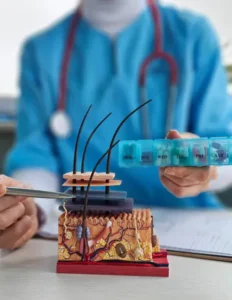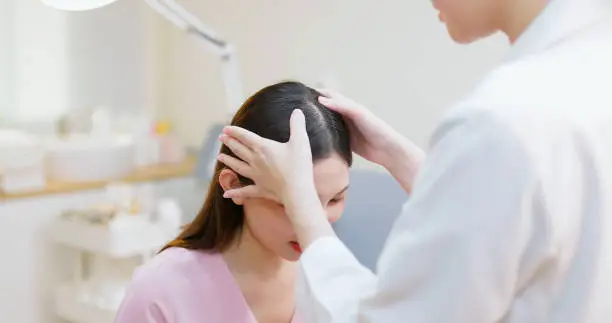Healthy hair tips
Healthy hair is often a reflection of a healthy lifestyle, proper care, and good habits. Whether you have straight, curly, or wavy hair, keeping it in top shape requires attention and consistent care.
In this guide, we’ll cover essential tips for maintaining healthy hair, common mistakes to avoid, the best products for different hair types, and advice on diet and lifestyle for promoting hair health.
Essential Hair Care Tips for Healthy Hair
Proper Shampooing Technique
Shampooing your hair is essential to keep your scalp clean and free from excess oil and buildup. However, over-washing or using the wrong products can strip your hair of essential oils and cause damage.
- Frequency: Shampoo your hair 2-3 times a week, depending on your hair type. Dry hair may need less frequent washing, while oily hair requires more regular cleaning.
- Choose the Right Shampoo: Pick a sulfate-free shampoo if you have dry or color-treated hair. Sulfates can strip natural oils and lead to dryness. For oily hair, opt for a clarifying shampoo, but don’t overuse it.
- Temperature of Water: Wash your hair with lukewarm water. Hot water can dry out your scalp and hair, leading to brittleness and split ends.
Condition Your Hair Properly
Conditioning is just as important as shampooing. The right conditioner helps replenish moisture and strengthens hair strands.
- Use the Right Conditioner: For fine hair, use a lightweight conditioner, while thick or dry hair benefits from rich, moisturizing products. Make sure to apply conditioner from mid-length to the ends, avoiding the scalp area to prevent it from getting greasy.
- Leave-In Conditioners: Leave-in conditioners can be great for adding moisture and protecting your hair from damage.
Avoid Heat Damage
Excessive heat styling can damage your hair, leading to dryness, split ends, and breakage. If you love using tools like flat irons, curling irons, or blow dryers, follow these guidelines to minimize damage.
- Use Heat Protectants: Always apply a heat protectant spray or serum before using any styling tools. This forms a protective barrier around the hair strands.
- Lower the Temperature: Set your styling tools to the lowest effective temperature to minimize the damage.
- Limit Heat Styling: Try to limit the use of hot tools to a few times per week. Embrace air-drying or heat-free styles like braids, twists, and buns for a break from heat styling.
Deep Conditioning Treatments
Deep conditioning helps restore moisture to dry or damaged hair, leaving it soft, smooth, and shiny. You should deep condition your hair once a week or bi-weekly.
- Use Hair Masks: Choose a deep conditioning mask based on your hair’s needs—hydrating, strengthening, or repairing.
- DIY Treatments: You can create your own hair masks at home using natural ingredients like coconut oil, honey, avocado, and yogurt.
Trimming and Haircuts
Regular trims are essential to maintain the health and appearance of your hair. Cutting off split ends helps prevent further damage and keeps your hair looking fresh.
- Trim Every 6-8 Weeks: This will keep split ends at bay and prevent your hair from becoming too damaged.
- Layering: Adding layers to your hair can give it more volume and prevent heavy ends from weighing your hair down.
Avoid Tight Hairstyles
Tight hairstyles like ponytails, buns, or braids can lead to hair breakage, thinning, or traction alopecia if worn frequently.
- Loose Hairstyles: Opt for loose braids, buns, or ponytails to avoid unnecessary tension on the scalp and hair.
- Change Up Your Styles: Frequently changing your hairstyle can reduce the strain on certain areas of your scalp.
Hair Nutrition: The Key to Strong, Healthy Hair
What you eat plays a significant role in the health of your hair. Hair growth and quality are closely linked to your diet, as your hair needs essential nutrients to grow and stay strong.
Protein-Rich Foods
Hair is made primarily of keratin, a type of protein. Consuming enough protein is crucial for healthy hair growth.
- Sources: Incorporate lean meats, fish, eggs, beans, lentils, and nuts into your diet.
- Biotin: This B-vitamin is essential for healthy hair growth. Include biotin-rich foods like eggs, almonds, sweet potatoes, and spinach.
Omega-3 Fatty Acids
Omega-3 fatty acids nourish hair follicles and support healthy scalp circulation, which helps promote hair growth.
- Sources: Fish like salmon, mackerel, and sardines are excellent sources of omega-3s. Plant-based sources include flaxseeds, chia seeds, and walnuts.
Vitamins and Minerals for Healthy Hair
Certain vitamins and minerals play an essential role in hair health:

- Vitamin C: A powerful antioxidant that helps with collagen production, which is crucial for hair structure. Sources include citrus fruits, strawberries, bell peppers, and broccoli.
- Vitamin D: Deficiency in vitamin D has been linked to hair loss. Sunlight exposure, fortified foods, and fatty fish are good sources of vitamin D.
- Zinc: Zinc supports hair growth and repair. It can be found in foods like pumpkin seeds, chickpeas, and lentils.
Hydration for Hair Health
Drinking plenty of water is essential for maintaining moisture levels in your hair and preventing dryness and brittleness.
- Water Intake: Aim for 8-10 cups of water per day to ensure your hair and scalp stay hydrated.
Lifestyle Habits for Strong Hair
Stress Management
Chronic stress can contribute to hair loss and slow down hair growth.
- Practice Relaxation: Engage in activities like yoga, meditation, deep breathing, or journaling to manage stress levels.
- Exercise: Regular physical activity boosts blood circulation, which supports healthy hair follicles.
Sleep and Hair Health
Getting enough sleep is essential for your body to repair and rejuvenate, including the hair follicles.
- Sleep Duration: Aim for 7-9 hours of sleep each night to allow your body to work its magic, including healthy hair growth.
- Silk Pillowcases: Sleeping on a silk pillowcase can reduce friction, helping to prevent hair breakage and frizz.
Scalp Health
A healthy scalp is the foundation for healthy hair. An unhealthy scalp can lead to hair thinning, dandruff, and other scalp conditions.
- Scalp Massage: Massaging your scalp can increase blood flow, promote hair growth, and reduce stress.
- Exfoliate Your Scalp: Occasionally exfoliate your scalp to remove dead skin cells and buildup. You can use a gentle scalp scrub or a mixture of sugar and coconut oil.
Hair Care Tips for Different Hair Types
Curly Hair
Curly hair is often more prone to dryness and frizz, so it requires extra care.

- Hydrate: Use deep conditioners and hair masks to lock in moisture.
- Avoid Heat: Minimize heat styling to prevent damage.
- Use a Diffuser: If blow-drying, use a diffuser to maintain the curl pattern.
Straight Hair
Straight hair can sometimes appear flat and limp, but it is usually easier to manage.
- Volume: Use lightweight products like volumizing mousse to give your hair lift.
- Prevent Oil Buildup: Use dry shampoo between washes to keep hair fresh and add volume.
Fine Hair
Fine hair is prone to limpness, but with the right techniques, it can appear fuller and healthier.
- Avoid Heavy Products: Use light styling products that won’t weigh your hair down.
- Root Lift: Use a volumizing mousse at the roots to create lift.
Thick Hair
Thick hair is often prone to dryness and frizz and can be difficult to manage.
- Deep Condition: Use heavy-duty conditioners and hair masks to keep hair hydrated.
- Anti-Frizz Products: Incorporate anti-frizz serums or oils to control flyaways. Healthy hair tips
Common Mistakes to Avoid for Healthy Hair
Over-Washing
Washing your hair too frequently can strip it of natural oils, leading to dryness and irritation. Stick to a schedule based on your hair type.
Over-Use of Chemical Treatments
Frequent coloring, bleaching, or perming can weaken hair and cause irreversible damage. If you’re using chemicals on your hair, be sure to use a lot of conditioning treatments to restore moisture.
Not Protecting Hair from the Sun
Just like your skin, your hair can suffer from UV damage. Wear hats or use UV-protectant sprays to protect your hair from the sun. Healthy hair tips
Skipping Regular Trims
Neglecting regular trims can result in split ends and unhealthy-looking hair. Regular trims every 6-8 weeks are key to maintaining healthy hair.
FAQ:
How often should I wash my hair?
It depends on your hair type. Generally, washing 2-3 times a week is sufficient. However, if you have oily hair, you may need to wash it more frequently. Dry hair, on the other hand, may need less frequent washing.
How can I stop my hair from falling out?
To prevent hair loss, avoid tight hairstyles, reduce stress, eat a balanced diet, and avoid harsh chemicals. Consult a dermatologist if hair loss persists.
What are the best vitamins for hair growth?
Biotin, vitamin D, vitamin C, omega-3 fatty acids, and zinc are all beneficial for hair health. A well-balanced diet can provide these nutrients.
Can I reverse hair damage from heat styling?
While you can’t fully reverse heat damage, you can minimize its effects by deep conditioning regularly, avoiding excessive heat, and using protective products.
What’s the best way to treat dry hair?
Deep conditioning, avoiding excessive heat, and using moisturizing shampoos and conditioners are key steps to combat dry hair. Adding natural oils like coconut oil or argan oil can also help restore moisture.

